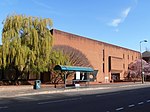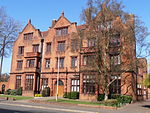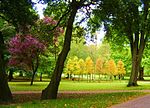Cathays railway works
Buildings and structures in CardiffRailway depots in WalesRailway workshops in Great BritainUse British English from April 2017
Cathays railways works was a railway engineering development by the Taff Vale Railway to provide its main carriage and wagon works, as well as its main railway depot for the entire TVR system, located in the Cathays suburb of Cardiff, South Wales. Taken over by the Great Western Railway, after nationalisation under British Railways they sold off the carriage and wagon works to the Pullman Company Ltd. Today, both the site of the railway depot and the carriage and wagon works have been redeveloped, mainly with buildings and commercial activities associated with the University of Cardiff.
Excerpt from the Wikipedia article Cathays railway works (License: CC BY-SA 3.0, Authors).Cathays railway works
Colum Drive, Cardiff Cathays
Geographical coordinates (GPS) Address Nearby Places Show on map
Geographical coordinates (GPS)
| Latitude | Longitude |
|---|---|
| N 51.492152777778 ° | E -3.1850916666667 ° |
Address
Cardiff University
Colum Drive
CF10 3EG Cardiff, Cathays
Wales, United Kingdom
Open on Google Maps











